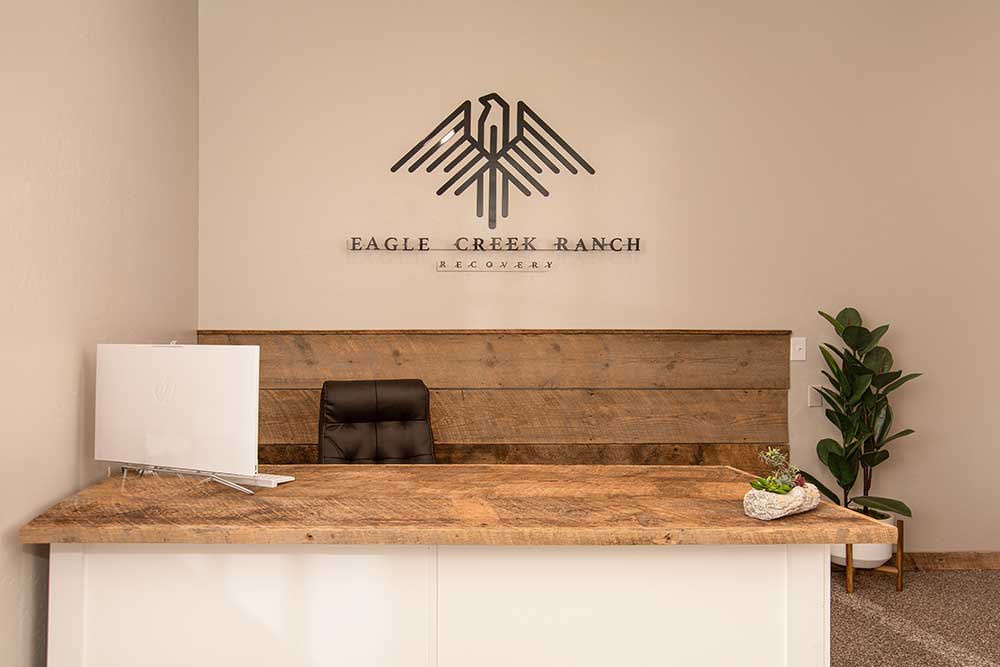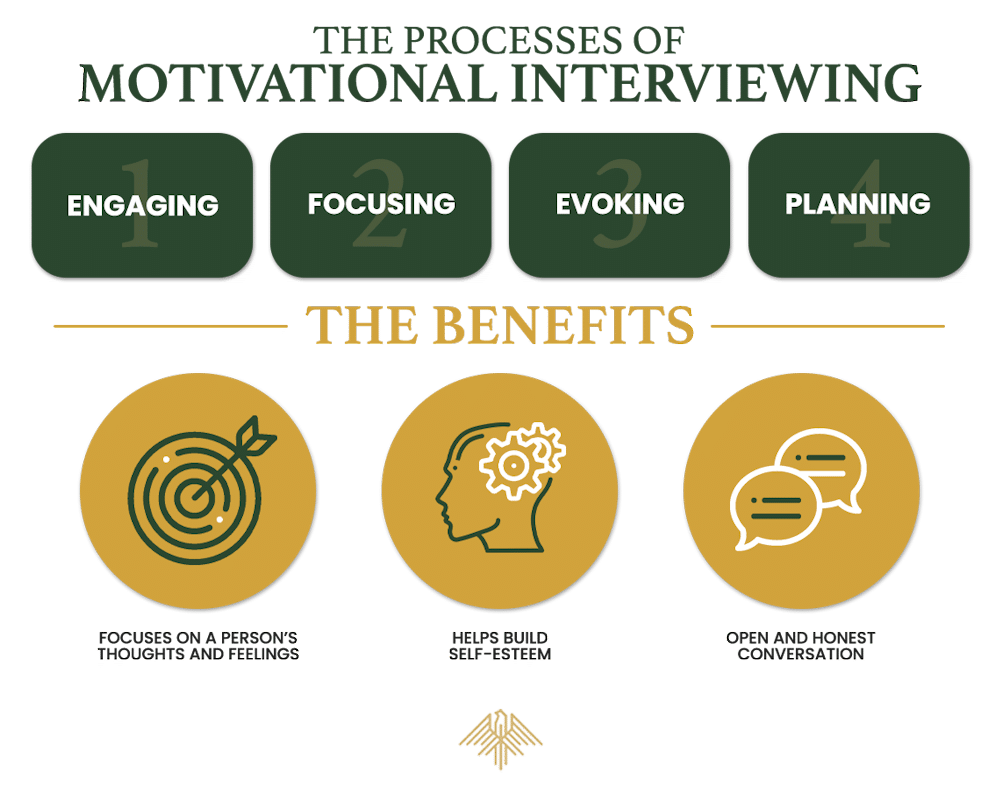Motivational Interviewing for Substance Abuse
When you enter into an addiction treatment program, many types of addiction therapy may be utilized within the treatment program you are participating in. The goal of these therapies is to help people recognize their true purpose in life, and that they can move beyond the need for substances like drugs or alcohol. One such therapy is called motivational interviewing for substance abuse.
For many people in recovery, achieving sobriety seems like an impossible task. Imagining and working towards a life without drugs or alcohol can feel impossible, especially after the individual has abused substances for a long time.
Further, addiction, many times, begins due to an individual using drugs or alcohol to cope. They may experience stress at work or home, trouble in relationships, grief, trauma, or struggle with mental health issues.
Substance abuse can become a quick and easy way to numb unpleasant feelings and emotions. Despite the many negative consequences of substance abuse—such as financial troubles, health problems, and strain on relationships—many people continue to use once they are addicted.
When individuals with a substance use disorder (SUD) lack the motivation to live without substance abuse. At Eagle Creek Ranch Recovery in Nampa, Idaho, motivational interviewing (MI) in conjunction with other forms of treatment, has been proven to be very effective in helping individuals to reframe their perspective and gain the motivation needed to work toward addiction recovery.
Motivational interviewing is a counseling approach that helps people who are in addiction treatment programs. It is based on the idea that people are capable of change, and it aims to help them find the motivation to make changes in their lives.
During these sessions, therapists will use a range of strategies such as reflective listening, open-ended questions, and self-directed dialogue to help the individual identify the internal motivation for change.
For some people in recovery, treatment may feel like a complete loss of control. Motivational interviewing can help restore a patient’s sense of control. Some of the substance use disorders this therapeutic technique is used for include the following:
- Alcohol use disorder (AUD)
- Opioid use disorder (OUD)
- Methamphetamine use disorder
- Cocaine use disorder
- Heroin use disorder
- Benzodiazepine use disorder
- Marijuana use disorder
- Fentanyl use disorder
While other forms of therapy address different aspects of recovery, motivational interviewing focuses on an individual’s motivation and commitment to sobriety. Through the processes involved in this type of therapy, motivational interviewing helps you develop a sense of responsibility for your well-being and facilitates involvement in your recovery journey.
Contact Eagle Creek Ranch
Recovery Today!
Why Wait? Find The Help You Need By Reaching Out To Us Today! Our Admissions Team Is Standing By.
The 4 Processes of Motivational Interviewing for Substance Abuse
Modern family therapy involves studying family dynamics and specific needs. Individual behavior, responses, and engagement in surrounding systems vary based on several factors. Therapists try to learn the broad context of those factors to better understand each person. As a result, the therapist can better understand relationships, communication, and issues within the family unit.
There are different processes and behaviors in families that can prevent beneficial changes. Therapists must determine what those hindrances are and how to try to remove them. In many cases, families do not realize certain hindrances lead to other problems. Also, they may not realize how family issues impact their relationships with peers, colleagues, and others outside the family unit. Therapists set goals with families based on important therapy guidelines. This applies to family therapy in addiction treatment as well.
Motivational interviewing is a highly structured form of therapeutic intervention. Within it are four processes that help participants create and achieve goals. The goals of these processes are to increase intrinsic motivation, reduce ambivalence about change, and support client autonomy. The four processes are as follows:
- Engaging: Establishing a trusting relationship between the patient and the counselor
- Focusing: The patient and counselor come to a shared goal for the focus of treatment
- Evoking: The counselor highlights the client’s ideas for a path forward toward recovery
- Planning: The client believes that change is possible and subsequently manifests it
The relationship between the patient and therapist is always of high importance in therapy. This relationship will directly influence the outcomes of therapy for the patient. Often, the relationship between the therapist or counselor and patient is as powerful as, if not more, than the method of treatment being employed to exact change in the patient’s life.
In motivational interviewing, the first of the four processes involves the building of a trusting relationship between the therapist and client. This, as previously mentioned, is necessary for the therapy to be effective and successful.
There are a few ways that this positive relationship is ensured. The counselor involved in motivational interviewing for substance abuse should be empathetic, open-minded, non-judgmental, supportive, and understanding when working with their patient. In
Establishing a goal can be very simple. For many patients, their goal when engaging in addiction treatment therapies is to stop using drugs or alcohol as a means to cope with the stress of life. Focusing on that goal, however, can prove to be challenging. If it was not, people would be able to simply quit substance abuse on their own without the help of a specialized treatment plan.
Therefore, the second process of motivational interviewing for substance abuse involves coming to a shared goal between the patient and the therapist. During this process, the counselor will discuss with the patient how and why they want to change their behavior related to substance use and abuse. This goal should be both realistic and relevant to the patient’s life.
The goals are generally based on problems within the patient’s life. This may involve how their substance abuse started and how it affects different aspects of their life. Once the unique goals of the patient are determined by the therapist and patient together, the therapist will focus conversation and treatment on these identified goals. Due to how complex identifying goals may be, this part of motivational interviewing for substance abuse may take anywhere from days to weeks to complete.
The third process in motivational interviewing for substance abuse is evoking. This leg of the four-part process involves exploring the patient’s deep motivations for change. The therapist will discuss the patient’s values and how they compare to their current behaviors. This is a way for the therapist to explore what drives the patient, both positively and negatively.
During the evoking process, the mental health professional will establish how the patient has the agency to effect change in their own life. This helps instill confidence in the patient as they work to reach the goals they set out in the previous process. By highlighting the patient’s ideas for a path forward, changing language and action can be applied to help the patient both visualize and work towards healing.
The last process in motivational interviewing for substance abuse is planning. In this stage, both the therapist and patient come up with an action plan for remaining sober. This is considered by many to be the most important part of the motivational interviewing process. All of the work done in the previous processes set the stage for this fourth and final process.
During the planning process, the client will develop mechanisms and coping strategies to remain sober—both during treatment and after they have completed their addiction treatment program. The client must understand that treatment is short-term, while addiction is a long-term problem. Once they leave the treatment center, patients need to be accountable for how they cope with stress in the real world.
In this stage, the therapist will ensure that the patient has the life skills in place that will help them stay sober outside of the treatment environment. This could involve helping them set achievable goals, finding a support system, getting the proper resources, and understanding how to manage triggers. After all, the overall goal of motivational interviewing is not to tell people what to do, but to help guide them toward discovering their solutions—and following through with them.
The Benefits of Motivational Interviewing for Substance Abuse
Motivational interviewing hosts a variety of benefits for those in addiction treatment programs. It helps individuals to gain an understanding of their thoughts and feelings about their addiction, as well as how it has impacted their life. This can be especially helpful for those who are feeling overwhelmed by the amount of change they need to make to achieve sobriety.
Additionally, motivational interviewing enables clients to actively participate in the conversation and take responsibility for their own choices. This helps to build self-esteem and autonomy, which can be especially beneficial for those in addiction treatment programs who may not have had many opportunities to exercise decision-making power in the past.
Finally, due to its nonjudgmental nature, motivational interviewing allows clients to feel more comfortable opening up about sensitive topics related to their substance abuse. This can help build a stronger therapeutic relationship between the client and the practitioner, which is essential for successful treatment outcomes.
Am I a Candidate for Motivational Interviewing?
You may be wondering if you are a good candidate for motivational interviewing. Generally speaking, motivational interviewing is best suited for people who are struggling with addiction and have expressed a desire to make changes in their life. However, it can also be beneficial for those who may not feel ready to change yet but could benefit from exploring the pros and cons of making such changes.
Ultimately, if you’re looking to stop using substances to cope and instead make healthy and productive decisions, struggle with setting goals, and need assistance in overcoming certain barriers preventing you from achieving your goals, then motivational interviewing can help.
It is important to note that motivational interviewing is not meant to replace traditional addiction treatment models or make promises of a quick fix for substance abuse. Rather, it helps individuals gain insight into their behavior and ultimately encourages them to seek the help they need to achieve the lifestyle they have always wanted free from the vicious cycle of addiction.
This form of therapy is not used as a stand-alone treatment and instead will be used alongside other methods of treatment such as individual therapy, adventure therapy, cognitive-behavioral therapy (CBT), and others.
Learn More About Motivational Interviewing at Eagle Creek Recovery

Eagle Creek Recovery strives to help individuals gain insight into their behavior and ultimately encourages the development of positive coping skills and behaviors necessary to facilitate recovery.
Through individualized sessions, therapists will begin by assessing an individual’s motivation for change and create an environment where they feel comfortable speaking freely about their experiences. Our goal of motivational interviewing is to create an environment where individuals are empowered to take control of their recovery process.
To learn more about motivational interviewing for substance abuse or any of our other addiction treatment therapies, please contact us today.

Clinical Director
Kendall Maloof is the clinical director at Eagle Creek Ranch Recovery. She is a licensed marriage and family therapist and has held multiple leadership roles before settling here at Eagle Creek. Kendall received her master’s degree in marriage and family therapy from the Chicago School of Professional Psychology in 2016. Her career in mental and behavioral health began in 2014 when she took up internships in both the nonprofit and for profit sectors. She interned at multiple reputable companies, such as The Living Success Center and 449 Recovery in California.
In 2019, Kendall became the clinical director of Sunsets Recovery for Woman, a dual diagnosis program in southern California. Kendall is a natural leader. She has an incredible ability to problem solve and stay calm in any situation. Kendall never fails to show up when she is needed, and her calm demeanor makes her team and clients feel at ease. Eagle Creek Ranch Recovery is proud to have Kendall as our clinical director.





